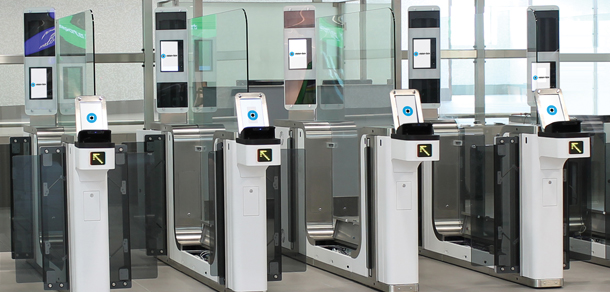adverts
The Ghana Immigration Service (GIS) has debunked claims circulating on social media alleging that the e-Gate system deployed at the Kotoka International Airport (KIA) cost taxpayers $240 million.
In a statement signed by Deputy Commissioner of Immigration, Maud Anima Quianoo, the GIS clarified the actual costs and details of the system, emphasising the need for accurate information.
The GIS categorically stated that the e-Gate system at KIA does not cost $240 million, as claimed. The actual cost of the e-Gate component alone, comprising 15 units with accessories, is $1.7 million ($1,760,479.80).
adverts
This comes after the minority in Parliament has raised alarm over the government’s decision to engage a private entity to activate the newly commissioned E-gate system at Kotoka International Airport (KIA), alleging corruption and irregularities in the $147 million agreement.
At a press conference in Accra on Wednesday, Minority Chief Whip Governs Agbodza criticised the deal, labelling it a “create, loot, and share” scheme. He questioned the justification for the high cost of the E-gate system, given that the entire airport was constructed for $250 million.
Agbodza warned government institutions, including the Ministry of Finance, Ghana Immigration Service, and the Bank of Ghana, against proceeding with the agreement.
He argued that the exorbitant cost lacked value for money and transparency.
“This is an illegality. Do not proceed. Every civil servant involved in hastily signing this agreement will be held accountable,” Agbodza stated, emphasising that the E-gate system is an integrated service meant to enhance airport operations, not to be a financial burden
According to GIS, the entire border management system at KIA, including the immigration control systems and the e-Gates, amounts to $5.5 million ($5,548,860.89).
The e-Gate system is part of a larger project called “Immigration 360,” an integrated border management system designed to fully automate passenger processing and data management across Ghana’s 48 approved entry and exit points.
This initiative addresses challenges such as sovereignty, interoperability, and inefficiencies in the current infrastructure at 12 approved borders.
The total cost of implementing the Immigration 360 system is $94.6 million ($94,664,374.57).
The GIS explained that the $240 million figure cited in social media discussions refers to the entire life-cycle cost of the Immigration 360 project. This includes:
- The initial implementation cost is $94.6 million.
- Two major five-year upgrade cycles to refresh technical infrastructure.
- Three replacement cycles for key system components.
- Maintenance, licenses, and operational support over a 10-year period.
When factoring in VAT, other taxes, and these periodic upgrades, the total cost of the system over its life cycle rises to $274 million.
The Immigration 360 system integrates seamlessly with:
- Local databases: Ghana’s National Identification System (NIS), Driver and Vehicle Licensing Authority (DVLA), and the National Stop/Watch List.
- International systems: INTERPOL’s Global Stop/Watch List, ICAO’s Public Key Directory (PKD), Advanced Passenger Information (API), Passenger Name Record (PNR), and PISCES.
This integration enhances travel, trade, and security operations while providing robust border management capabilities.
The project is being developed by Margins ID Systems Application Ltd., a private Ghanaian company. Importantly, the $94.6 million implementation cost is pre-financed by Margins ID Systems and will be repaid through revenue generated from the system.
The GIS assured the public of its commitment to transparency and urged citizens to disregard the misinformation. It emphasised the strategic importance of the Immigration 360 system in modernising Ghana’s border management infrastructure.


